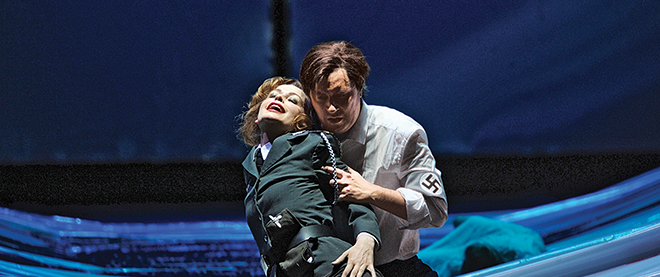What to do about Wagner?
Germany is divided over how to honour the controversial composer’s bicentenary
Hans Joerg Michel
Share

The story goes that Adolf Hitler first heard Richard Wagner’s music when he was 12. The year was 1901—and the setting was Linz, Austria, where the young boy had gone with his friend Gustl to see a production of the opera Lohengrin. “In one instant I was addicted,” Hitler would write of his first encounter with Wagner. Decades later, Hitler—by then a budding führer—was said to hum Lohengrin tunes while pacing a room.
May 22 marked the 200th anniversary of Wagner’s birth. The occasion was feted worldwide, with commemorative performances in London, New York and Milan. In Germany, however, the mood was tempered by more sombre appraisals of the man behind the music. Wagner was a virulent anti-Semite, and his posthumous association with Hitler has made it hard for Germans to consume his music without apology. In Berlin, the bicentenary was as much an opportunity for post-Third Reich hand-wringing as it was an artistic celebration.
Early in May, an adaptation of Wagner’s Tannhäuser opened in Düsseldorf; set in a Nazi concentration camp during the Holocaust, its traditionally erotic overture was replaced by a gas chamber murder scene. The production was expected to be one of the highlights of the bicentenary, but the controversial staging was quickly pulled—after an outpouring of complaints and reports that some audience members were so traumatized they required medical attention. In 2012, a production of Wagner’s Flying Dutchman in northern Bavaria was nearly cancelled after news leaked that its star, Evgeny Nikitin, had a large swastika tattooed on his chest.
The bicentenary has dredged up old debates about the true nature of the Wagner-Hitler connection. Did Wagner’s anti-Semitism inspire Hitler directly? If so, is there something inherently anti-Semitic in Wagner’s melodies? Or was Wagner, who died before Hitler was born, merely an anticipation of what was to come? On the other hand, is it possible that Wagner’s legacy was simply exploited by Nazi leaders? Perhaps the composer’s fondness for epic sagas and Teutonic heroes made his music amenable to Fascist fetishization.
Wagner’s legacy endures in Germany. The Bayreuth Festspielhaus—the operahouse Wagner built in northern Bavaria—remains a shrine. Wagnerites wait up to 10 years for tickets to the annual Bayreuth Festival (run by Wagner’s descendants), where aficionados like German Chancellor Angela Merkel imbibe Wagner’s stormy harmonies, and the festival’s famed lobster bratwurst. The most slavish admirers (or “Wagnerheads”) chase Wagner performances across the globe.
But in public discussions, Wagner’s music is invariably entangled with his politics. Of course, it’s not all about Nazis. The bicentenary has also offered a chance for Wagner haters to air their distaste. The less-than-enthused deride Wagner’s pomp and pageantry, his inaccessibility and indulgence. “Wagnerian,” notes the London Review of Books’ Nicholas Spice, “has passed into our language as a byword for the exorbitant, the over-scaled and the interminable.”
This antipathy is nothing new. Eighteenth-century doctors worried that Wagner’s music caused ailments ranging from melancholy to infertility—and that it provoked hysteria in women. In the 20th century, two conductors collapsed and died while conducting Tristan und Isolde. In 1865, the singer Ludwig Schnorr von Carolsfeld died in delirium shortly after his debut as Tristan. Wagner believed that his music drove the singer “to the abyss.”
Earlier this month, Wagner’s great-granddaughter Katharina Wagner announced that she would, at last, turn over her family’s private archives to historians—so that they might better assess the family’s Nazi links. But for now, Germans continue to enjoy Wagner’s bicentenary with the requisite vestiges of Holocaust guilt. Taking note of this sentiment, Der Spiegel recently bemoaned: “Can Germans enjoy any part of their history in a carefree way?”